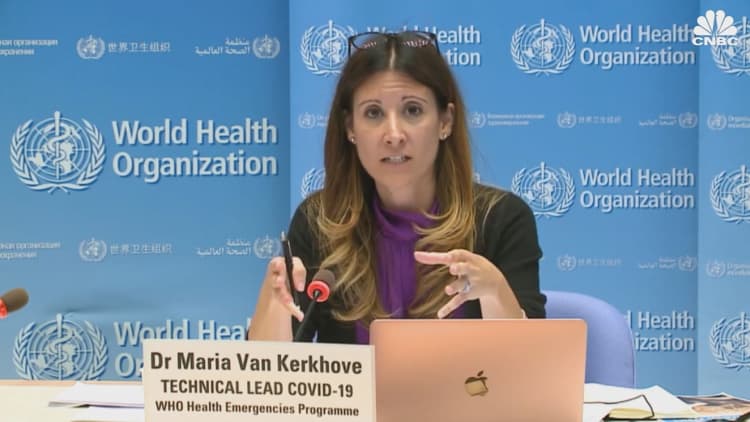
The World Health Organization walked back comments made Monday when one of its top scientists said transmission of the coronavirus by people who never developed symptoms is "very rare," which drew skepticism from physicians and others across social media.
That admission sent shock waves throughout the world, much of which has been locked down for months for fear of spreading the virus by people who show no signs of illness.
Dr. Maria Van Kerkhove, head of the WHO's emerging diseases and zoonosis unit, said Tuesday that asymptomatic spread is a "really complex question" and much is still unknown. "We don't actually have that answer yet," she said.
"I was responding to a question at the press conference. I wasn't stating a policy of WHO or anything like that. I was just trying to articulate what we know," she said on a live Q&A streamed across multiple social media platforms. "And in that, I used the phrase 'very rare,' and I think that that's misunderstanding to state that asymptomatic transmission globally is very rare. I was referring to a small subset of studies."
Read more: Coronavirus live updates: WHO clarifies remarks on asymptomatic spread; data shows China had virus in fall
Studies show that about 16% of the population may be asymptomatic, she said. Some models developed by other scientists suggest as much as 40% of global transmission may be due to asymptomatic individuals, she said, clarifying her comments.
"Some estimates of around 40% of transmission may be due to asymptomatic, but those are from models, so I didn't include that in my answer yesterday, but wanted to make sure that I covered that here," Kerkhove said.
The majority of transmission is from people who have symptoms and are spreading it through infectious droplets, she said. "But there are a subset of people who don't develop symptoms. To truly understand how many people don't have symptoms, we don't actually have that answer yet," she added.

While asymptomatic spread of the coronavirus does occur, the portion of asymptomatic individuals who transmit the virus remains a "big open question," Dr. Mike Ryan, executive director of the WHO's emergencies program, said during the Q&A.
"There is much to be answered on this. There is much that is unknown," he added. "It's clear that both symptomatic and asymptomatic individuals are part of the transmission cycle. The question is what is the relative contribution of each group to overall number of cases."
An asymptomatic person is someone with Covid-19 who doesn't have symptoms and never develops symptoms. Both scientists clarified that it's not the same as someone who later develops symptoms, who would be classified as pre-symptomatic.
On Monday, WHO officials said asymptomatic people aren't driving the spread of the virus, casting doubt on concerns by some researchers that the disease could be difficult to contain due to asymptomatic infections.
"From the data we have, it still seems to be rare that an asymptomatic person actually transmits onward to a secondary individual," Kerkhove said at a news briefing Monday from the WHO's Geneva headquarters. "It's very rare."
Ryan acknowledged that Kerkhove's comments created a stir, saying they may have been "misinterpreted or maybe we didn't use the most elegant words to explain that."
"We need that debate," he said.
"If journalists and the public think we're straying away from evidence, then fine," he said. "That's what this is for. If you think there isn't a basis for what we're saying then let's have that debate one-on-one. That's why we're here. That was not intended. That was not the intention of the statement."

